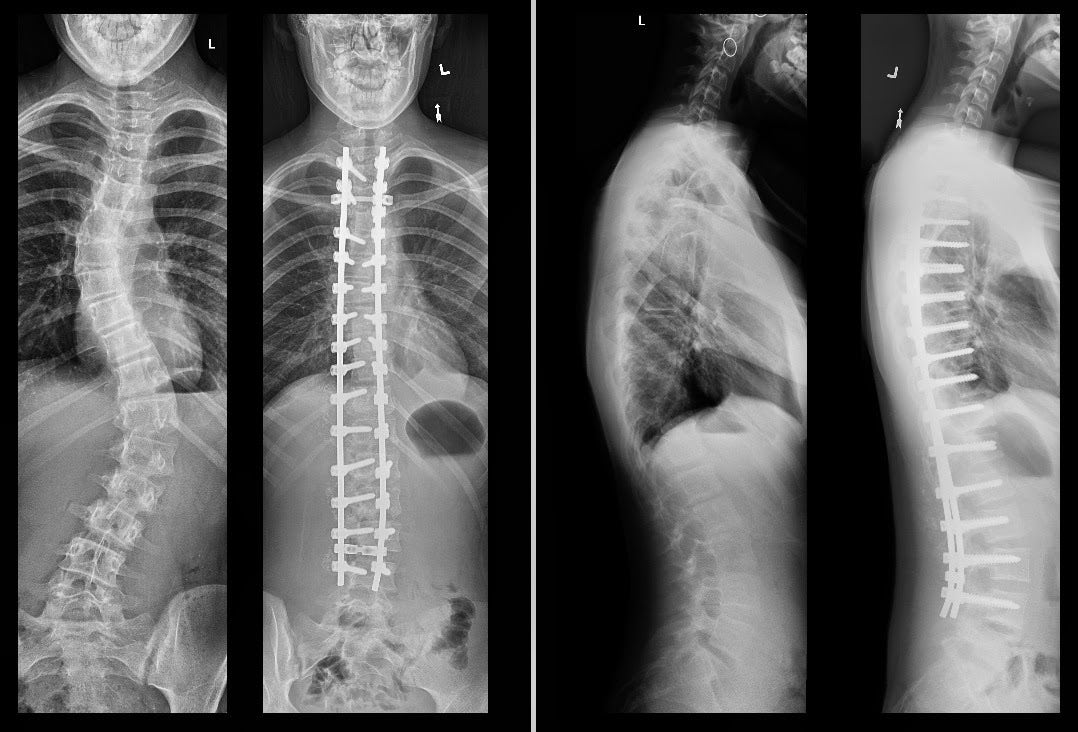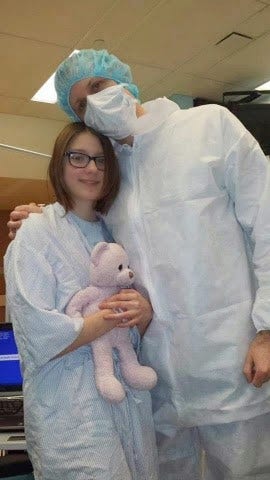How My Daughter's Spinal Fusion Changed My Parenting Style Forever
Lessons learned from my daughter's life-altering surgery.
 Personal medical record, courtesy of the author
Personal medical record, courtesy of the author Photo above: Avery's spine before and after spinal fusion surgery (front view & side view). Two chrome cobalt rods are held in place by 29 titanium screws (which are two inches long!) The margin for error on each hole the surgeon drilled into the vertebrae was only 1/64 of an inch. A miss by more than that could result in paralyzation.
For my family, the punch that knocked the wind out of us was a diagnosis of severe idiopathic scoliosis for our then eleven-year-old daughter, Avery. The only viable treatment option was spinal fusion surgery, which is an eleven-hour surgery.
It was a terrifying prospect to stare down and one that ended up preceded by 256 days of fear, anxiety, and doubt.
Frustrated with the lack of information on what the family would actually experience, Avery’s mother and my wife, Jodi, started a family blog.
We chronicled the journey with close-to-real-time posts and eventually brought them together in a book along with additional notes, stories, behind-the-scenes information we didn’t blog, some Q&A, and the lessons learned you are about to read here.
Lessons don’t just apply to parents of children with scoliosis, but to parents, friends, and loved ones of anyone going through a traumatic event be it medical or otherwise.
We are fortunate enough to live in Canada and have access to some of the greatest, most affordable medical care one could hope for.
Not a minute has passed since this incredible journey began that I haven’t been thankful for. There are too many people in this world who don’t have access to, or can’t afford, these miracles. Hopefully, through our words a friend will gain some insight, a parent will gain some confidence, or a child will gain some comfort just as many others already have.
While Avery achieved the best possible outcome, it was a heck of a journey.
As I look back at everything, here are a few lessons that served my wife and me quite well — six tips to help get you ready, get you through the worst part of what you're experiencing, and walk side-by-side with your loved one on the road to recovery.

Andrew and his daughter, Avery, before he walked her into the operating room for her 11-hour spinal fusion surgery
Here are 7 things you can do to help your loved one through a challenging medical journey:
1. Give them a voice
Before the surgery, my daughter wouldn’t talk much about her feelings. If she did, she always seemed like she was trying to get an answer right on a test. I suppose that’s the world she lives in, though. Answer a question, and get a grade.
Knowing the surgery was weighing on her, it was important she got the chance to express herself freely and without judgment. Whether it is through a blog, a journal, a coloring book, or a listening ear I recommend you make sure your loved one has a medium to communicate their feelings. Let them know they have a voice and give them the opportunity to use it.
2. Share your voice with them
I sat down regularly with my daughter and asked her if she had written anything recently. I already knew if she had or not, but it gave her the opportunity to try to articulate her feelings. Then, I shared my feelings with her.
We discussed visualizations and meditation after yoga class, and I told her all the things that worked for me.
It was easy for me to think that sharing my fears would make things worse; that I needed to ‘be strong’ and ‘show no fear,’ but by not sharing my thoughts I was missing out on the perfect opportunity to show her ways to manage fear and it became something we acknowledged and dealt with together.
3. Count your blessings
Every time I found myself feeling depressed over the crappy hand we were dealt I also thought about how lucky my daughter was that she had a problem that could be fixed. This wasn’t an elective procedure. It was necessary for her health but in the end, it would make her almost as good as new.
Many are not as fortunate and would gladly switch places. Also, my daughter was lucky that she had free access to a team of incredibly skilled and dedicated healthcare professionals. This isn’t an exercise in comparing pain and suffering, but rather to acknowledge the wins — and make no mistake, there are wins there. Look closely and you will find them. Be thankful when you do.
4. Take care of yourself
The waiting during the surgery was torture. I could barely stomach the simplest foods and I didn’t want to drink too much and need to use the bathroom. What if I was needed for… something? What if something happened? I needed to be right there.
My wife, who is much more pragmatic than I am, encouraged me to use this time to rest, write emails to family or friends, blog, watch TV, or do whatever possible to try and remain calm.
As hard as it was, eating was paramount. Strength and energy (mental and physical) are needed in epic proportions in times like these. Ensure your reserve tanks are filled to the brim. You cannot fill someone else’s cup if yours is empty.
5. Sometimes no news is good news
Not knowing what’s happening is hard. I remember my wife constantly had to remind me that everyone in that operating room was doing their very best and if there was a concern that needed to be brought to our attention, they would tell us.
The same applies to myriad other situations. Let the experts do what they do. They got this.
6. Put yourself in their shoes
After the surgical team does its part it’s time for your loved one to do theirs.
This is the perfect time to walk a mile in their shoes.
Remember that they will be tired, confused, probably medicated, and likely in varying degrees of emotional or physical pain. Cut them some slack if they aren’t the cheery, polite person you know and love. They’ve been through a lot and have healing to do. A little empathy goes a long way.
7. Be there for them
When I asked Avery what was the best thing that Jodi and I did for her throughout her diagnosis, surgery, and recovery she said, “You were there for me.”
You don’t have to be perfect, but you do have to be present, and it will make all the difference in the world.
Andrew Butters is a family blogger and writer. He is the author of Bent But Not Broken: One Family's Scoliosis Journey.
